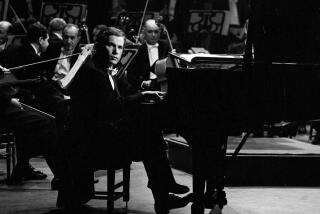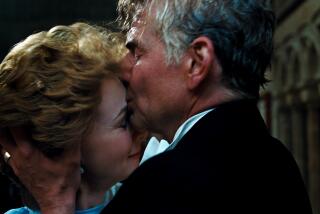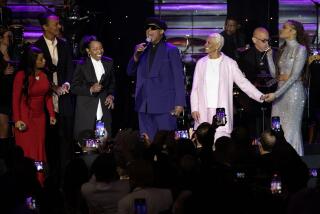Bernstein Mourned, Celebrated at Carnegie Hall : Music: Lenny’s loved ones and colleagues make a ‘joyful noise’ at eclectic memorial concert.
NEW YORK — It was on Nov. 14, 1943, that the 25-year-old Leonard Bernstein, somewhat hung over (as the story has come down to us) but exceedingly well-prepared, stepped onto the podium at Carnegie Hall to conduct the New York Philharmonic as a last-minute replacement, launching what was to become a brilliant, globe-spanning and almost legendary career.
Wednesday, 47 years to the day after that event and one month after his death at age 72, that same stage was filled to overflowing with an international array of orchestral musicians and a parade of musical luminaries who were among Bernstein’s numerous colleagues, collaborators and friends--all of them taking part in “A Concert Remembering Lenny.”
It was truly a concert and not a memorial service. Speeches were few and mostly consisted of readings from Bernstein’s own writings. Each of his three children spoke; his daughter Jamie Bernstein Thomas offered the welcoming remarks, assuring the invited capacity audience that applause was appropriate, since “Daddy always loved a joyful noise.”
Lauren Bacall, Schuyler Chapin, Bernstein’s daughter Nina and son Alexander each read brief excerpts from the maestro’s musings about music--his own and others. Humor was much in evidence, as in the segment on Copland read by Bacall in which Bernstein recalled loudly laughing and sobbing his way through a Bette Davis film with his fellow composer, who finally turned to him and said: “Can’t you shut up?” and in the irreverent 1965 poem, read by Alexander Bernstein, in which Bernstein mocked the atonal, gadget-ridden trends of contemporary music and offered up his latest, “Chichester Psalms,” as “a simple, modest affair--tonal and tuneful and somewhat square.”
A section of that work, conducted by longtime Bernstein colleague Michael Tilson Thomas, closed the program, which opened with Tilson Thomas conducting three selections from Bernstein’s 1971 “Mass,” with baritone Thomas Hampson as soloist. The expansive orchestra for these and all works on the program consisted of the New York Philharmonic augmented by members of other orchestras with which Bernstein had longstanding affiliations: the Boston Symphony, Israel Philharmonic, Vienna Philharmonic, London Symphony and Santa Cecelia Orchestra.
Other Bernstein works performed were selections from “Songfest,” sung by baritone Chester Ludgin and soprano Clamma Dale and conducted by Michael Barrett; “On the Town,” with Tilson Thomas on the podium; the Symphonic Dances from “West Side Story,” conducted by James Levine; and “Candide.” Jerry Hadley, who performs that work’s title role on the upcoming recording that Bernstein completed last winter, sang “It Must Be So.” Just before that, the orchestra tore through “Candide’s” famous overture--but without a conductor--earning a standing ovation from many in the house.
Particularly warm receptions also greeted Marilyn Horne, who sang Copland’s arrangement of “At the River,” and Christa Ludwig, who performed one of Mahler’s Ruckert songs, with Levine conducting for both singers. Mstislav Rostropovich played the Sarabande from Bach’s Cello Suite No. 5. Christoph Eschenbach led excerpts from symphonies by Haydn and Schumann, two composers close to Bernstein’s heart, and Tilson Thomas conducted the elegiac “Quiet City” by Copland, whose 90th birthday it happened to be.
In her remarks, Jamie Bernstein Thomas noted that her father would have approved of the program’s eclecticism. He would also have concurred with her heartfelt remembrance: “What fun we all had while it lasted.”
More to Read
The biggest entertainment stories
Get our big stories about Hollywood, film, television, music, arts, culture and more right in your inbox as soon as they publish.
You may occasionally receive promotional content from the Los Angeles Times.










